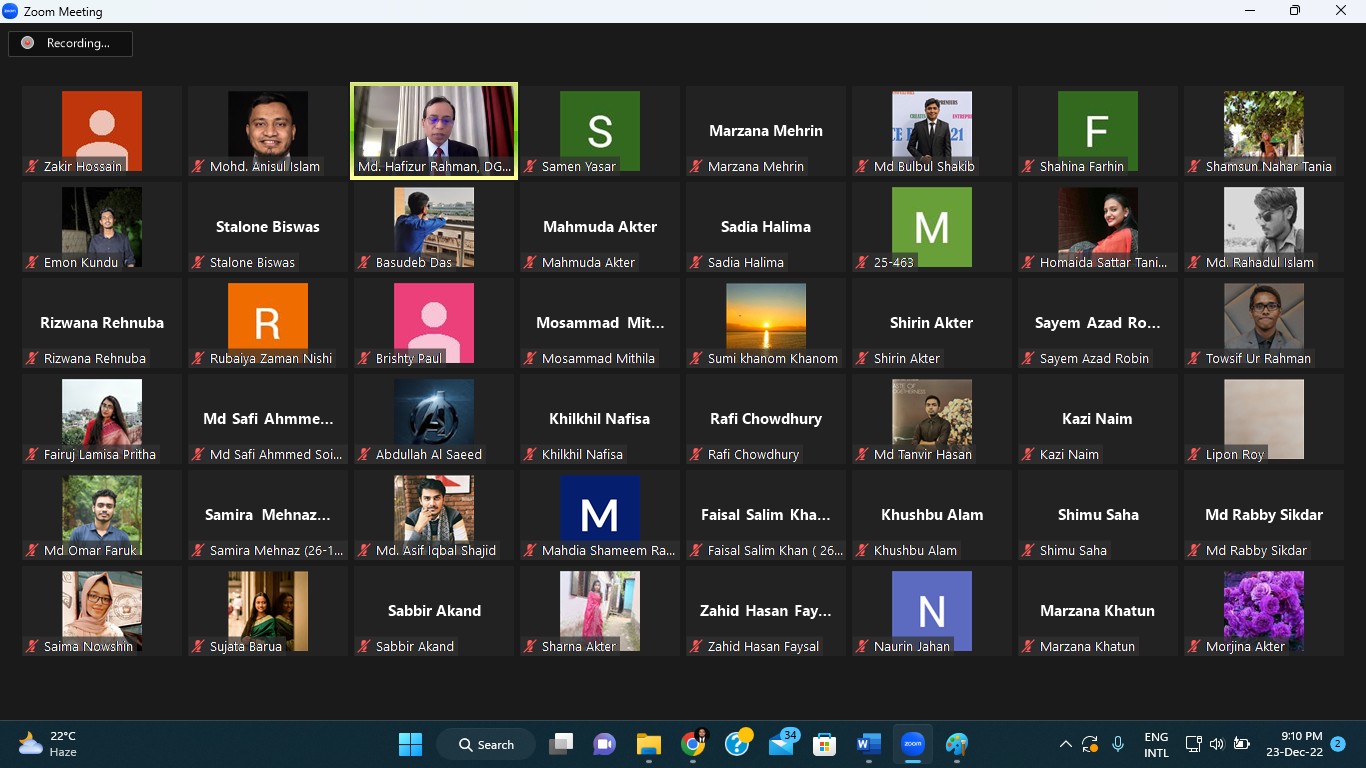
Session on Anti-dumping Duty Takes Place at Department of Finance
On December 23, 2022, a session on anti-dumping duty took place for the 3rd year students of Department of Finance, University of Dhaka. The session was conducted by Md. Hafizur Rahman, Director General (Additional Secretary), WTO Wing of Ministry of Commerce and moderated by Mohd. Anisul Islam, Assistant Professor, Department of Finance, University of Dhaka.
The purpose of the session was to enhance the knowledge of the students regarding anti-dumping duties as Bangladesh has been facing such duties at an increasing rate. The number of anti-dumping duties on Bangladesh is likely to increase further once the country graduates from its LDC status in 2026. Mr. Hafizur Rahman conducted the session from India, where he is currently attending a hearing regarding an anti-dumping duty India imposed on Bangladesh. This stresses the importance of this topic even further. The session was joined by around 200 enthusiastic students who are eager to learn how they may help the country in the future regarding anti-dumping issues.
Mr. Hafizur Rahman started the session by stating that Bangladesh is currently facing anti-dumping duties from many countries, India being one of the most significant ones. India imposed anti-dumping duties on jute goods, hydrogen peroxide, clear float glass, and fishing nets. Bangladesh responded to the clear float glass duty and it was lifted upon investigation by India’s DGTR. The duty on hydrogen peroxide was also lifted this year after a sunset review. This shows that capable responses will lead to favorable outcomes for the country. Currently, Bangladesh is working on lifting the anti-dumping duties on jute goods.
Then, Mr. Rahman discussed The Great Depression of the 1930s and how it augmented the usage of tariffs and other protectionist measures by countries. He also talked about how these issues led to the formation of GATT, which was replaced by the WTO in 1995. WTO now sets the rules and regulations regarding international trade. The discourse settlement body of WTO handles cases filed by countries regarding violations of WTO rules and regulations. The organization allows countries to have safeguard measures to protect themselves from issues created by fair trade and also permits the use of countervailing measures and anti-dumping measures as protection from unfair trade activities. This is where the keynote of the session comes from.
He then discussed the legal basis of anti-dumping actions, which comes from Article VI of GATT 1994 and the Anti-dumping Agreement. These depict the three pillars of anti-dumping measures, which are- 1. Dumping 2. Injury and 3. Causation.
Dumping is when a country exports its product at a price that is lower than its normal value. This is likely to increase the imports of the importing country and also hurt its domestic suppliers. Many financial aspects regarding determining ordinary course of trade and normal value were discussed here.
Mr. Rahman stressed that three types of professionals are required to respond to anti-dumping measures. They are trade economists, legal experts, and financial analysts, which shows the necessity of learning this topic for finance students.
The next pillar, which is injury, is where financial analysts are needed the most. The analysts have to determine whether there has been an injury to the economy and also calculate its monetary value. Finally, the third pillar is causation, where it has to be proven that the injury has been caused by the dumping activities of the exporting country. Finally, a cumulative analysis determines whether there is a legal basis for anti-dumping measures.
Mr. Rahman took questions from the students throughout the session and answered all of them in detail. He also shared case studies regarding anti-dumping issues faced by Bangladesh, which will be utilized in the academic activities of the students of the department. The session was insightful and was an amazing learning experience for the finance students of University of Dhaka.
The chairman of Department of Finance, University of Dhaka, Dr. M. Jahangir Alam Chowdhury expressed his gratitude to Md. Hafizur Rahman for conducting the insightful session. The session was finally wrapped up as the students and the moderator of the session Mohd. Anisul Islam expressed their gratitude to the honorable speaker.